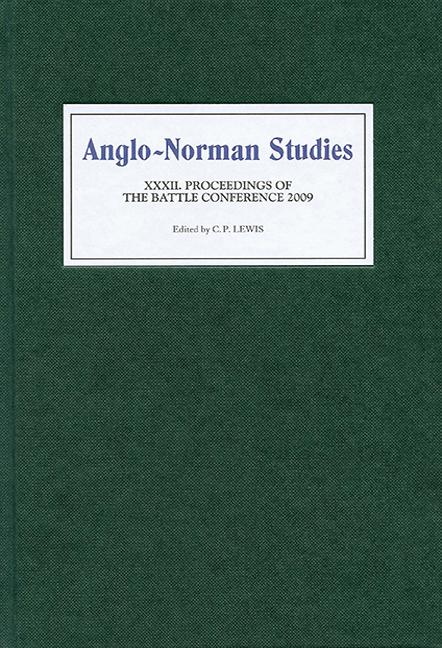Book contents
- Frontmatter
- Contents
- List of Maps and Tables
- Editor's Preface
- Abbreviations
- The Peace of God and Bishops at War in the Gallic Lands from the Late Tenth to the Early Twelfth Century
- Ad erudiendum tradidit: The Upbringing of Angevin Comital Children
- Coming and Going: The Use of Outdoor Space in Norman and Anglo-Norman Chronicles
- The Urban Transformation in England, 900–1100
- The Taming of the Laity: Writing Waltheof and Rebellion in the Twelfth Century
- Close Relations? Some Examples of Trade Links between England and the Towns and Ports of Lower Normandy in the Thirteenth and Early Fourteenth Centuries
- The Roots of the English Royal Forest
- Knighthood and Chivalry in the Histories of the Norman Dukes: Dudo and Benoît
- Prayers for the King and Royal Titles in Anglo-Norman Charters
- Domesday Mortlake
- Miscellaneous Endmatter
Ad erudiendum tradidit: The Upbringing of Angevin Comital Children
Published online by Cambridge University Press: 28 April 2017
- Frontmatter
- Contents
- List of Maps and Tables
- Editor's Preface
- Abbreviations
- The Peace of God and Bishops at War in the Gallic Lands from the Late Tenth to the Early Twelfth Century
- Ad erudiendum tradidit: The Upbringing of Angevin Comital Children
- Coming and Going: The Use of Outdoor Space in Norman and Anglo-Norman Chronicles
- The Urban Transformation in England, 900–1100
- The Taming of the Laity: Writing Waltheof and Rebellion in the Twelfth Century
- Close Relations? Some Examples of Trade Links between England and the Towns and Ports of Lower Normandy in the Thirteenth and Early Fourteenth Centuries
- The Roots of the English Royal Forest
- Knighthood and Chivalry in the Histories of the Norman Dukes: Dudo and Benoît
- Prayers for the King and Royal Titles in Anglo-Norman Charters
- Domesday Mortlake
- Miscellaneous Endmatter
Summary
This paper examines some aspects of how the counts of Anjou raised, educated, and trained their children during the first half of the twelfth century. The considerable corpus of distinctive Angevin comital acta contains rich evidence, often lacking from the chronicles, which indicates that from an early age the counts’ children remained within the parental household for training and education under non-parental figures. Some of these, namely the masters (magistri) of Henry II, have been much discussed, while others, given the title nutricii, have received only limited attention. The Angevin charters provide extensive evidence for the presence of both magistri and nutricii, and the conclusions which may be drawn add to the weight of evidence from England, Normandy, and elsewhere, and in turn suggest a need to rethink the influential view that such children were educated and trained in other noble households, returning to the court only ‘when they could join the [ruler's] military household, play a part in the affairs of state, and possibly benefit from the company of poets and scholars gathered there’.
Despite the relative lack of contemporary Angevin chronicles, the charters issued by the dynasty before Henry II's accession to the duchy of Normandy have remained somewhat neglected by Anglophone historians, not least because no modern edition of them exists. Over 700 acta issued between 975 and 1151 have survived in one form or another, nearly 400 of which are from the first half of the twelfth century. The narrative, ‘literary’ style of Angevin comital charters noted by Haskins means that they contain details often lacking in their Anglo-Norman and French counterparts, including references to childhood and upbringing. Although the problems associated with charters demand a cautious approach to this kind of evidence, the charter witness-lists in particular have the potential to elucidate the auxiliary role played by nutricii and magistri during this period. They not only provide the names of such individuals, but also allow examination of their roles, origins, social status, and milieux, how they entered the count's service, and how long they served.
The Angevins are a particularly suitable case for examination, as it has become a commonplace that the dynasty had a reputation for learning, literacy, and culture, combined with military excellence, but the narrative sources of the period are conspicuously lacking in details concerning their early lives.
- Type
- Chapter
- Information
- Anglo-Norman Studies XXXIIProceedings of the Battle Conference 2009, pp. 24 - 39Publisher: Boydell & BrewerPrint publication year: 2010

